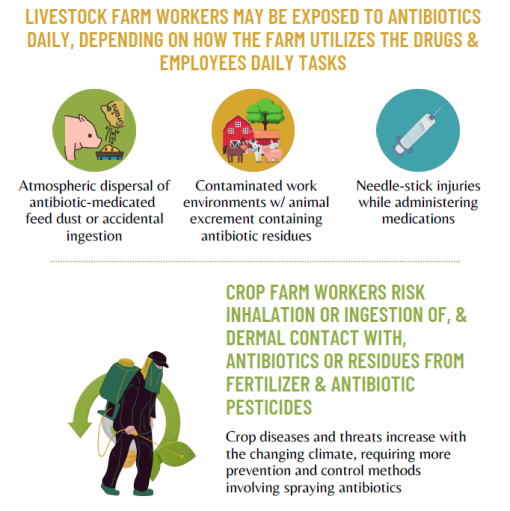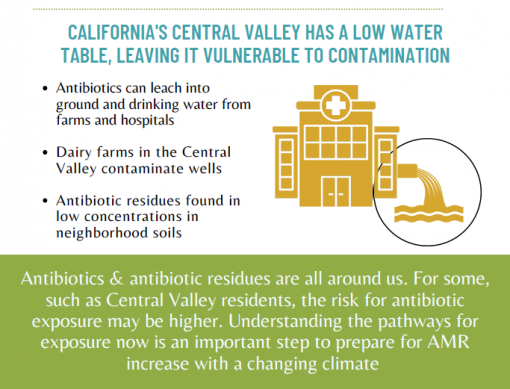Pathways of Antibiotic Exposure: a case study of California’s Central Valley
By Brittany Lauren Morgan Bustamante, PhD, MPH, UC Davis
2022-2023 Student Ambassador Cohort - Center for Planetary Health
June 2, 2023
Antimicrobial resistance (AMR) is a global health issue expected to worsen with climate change. Excessive & unnecessary exposure to antibiotics leads to AMR, and understanding the pathways of antibiotic exposure can help identify high-risk population, document & understand disparities, & implement interventions. California’s Central Valley is an ideal place to investigate the varied potential pathways for antibiotic exposure. The area is the largest agricultural region in California, healthcare is mostly delivered in rural environments, and the region suffers disproportionally from air pollution and water contamination. Further, individuals living in the Valley have the poorest health outcomes in the state, increasing their risk for the negative health impacts due to AMR.


References
University of California, Merced. UC Merced Community and Labor Center. Published 2020.https://clc.ucmerced.edu/
CalEnviroScreen 3.0. OEHHA. Published 2020. Accessed December 17, 2020. https://oehha.maps.arcgis.com/apps/MapSeries/index.html?appid=8dad35dcd2274285874e60871c404edc
CHF. California’s Rural Health Clinics: Obstacles and Opportunities. California HealthCare Foundation;2012:31. https://www.calhospital.org/sites/main/files/file-attachments/ruralhealthclinics2012.pdf?1349883908
Elmund G, Morrison S, et al. Role of excreted chlortetracycline in modifying the decomposition process infeedlot waste. Bull Env Toxicol. 1971;6:129-132.
FDA Animal Drug Safety Communication: FDA Highlights Potential Health Risks to People Exposed toAltrenogest Products for Horses or Pigs. FDA; 2020. Accessed December 17, 2020.https://www.fda.gov/animal-veterinary/cvm-updates/fda-animal-drug-safety-communication-fda-highlights-potential-health-risks-people-exposed
Gharibi H, Entwistle MR, Ha S, et al. Ozone pollution and asthma emergency department visits in theCentral Valley, California, USA, during June to September of 2015: a time-stratified case-crossoveranalysis. J Asthma. 2019;56(10):1037-1048. doi:10.1080/02770903.2018.1523930
Guron GKP, Arango-Argoty G, Zhang L, Pruden A, Ponder MA. Effects of Dairy Manure-BasedAmendments and Soil Texture on Lettuce- and Radish-Associated Microbiota and Resistomes. McMahonK, ed. mSphere. 2019;4(3):e00239-19, /msphere/4/3/mSphere239-19.atom. doi:10.1128/mSphere.00239-19
Hafer A, Langley R, Morrow W, Tulis J. Occupational hazards reported by swine veterinarians in theUnited States. J Swine Health Prod. 1996;4:128-141.
Hong P-Y, Al-Jassim N, Ansari M, Mackie R. Environmental and Public Health Implications of WaterReuse: Antibiotics, Antibiotic Resistant Bacteria, and Antibiotic Resistance Genes. Antibiotics.2013;2(3):367-399. doi:10.3390/antibiotics2030367
McManus PS. Does a drop in the bucket make a splash? Assessing the impact of antibiotic use on plants.Curr Opin Microbiol. 2014;19:76-82. doi:10.1016/j.mib.2014.05.013
Núñez-Mchiri GG. The Political Ecology of the Colonias. :26.PPIC. California’s Central Valley. Public Policy Institute of California; 2006. www.ppic.org
Schwartz NA, Pepper D. Childhood Asthma, Air Quality, and Social Suffering Among MexicanAmericans in California’s San Joaquin Valley: “Nobody Talks to Us Here.” Med Anthropol.2009;28(4):336-367. doi:10.1080/01459740903303944
Robert Wood Johnson Foundation. California Health Rankings. County Health Rankings & Roadmaps.Published 2020. Accessed December 17, 2020.https://www.countyhealthrankings.org/app/california/2015/overview
Sarmah AK, Meyer MT, Boxall ABA. A global perspective on the use, sales, exposure pathways,occurrence, fate and effects of veterinary antibiotics (VAs) in the environment. Chemosphere.2006;65(5):725-759. doi:10.1016/j.chemosphere.2006.03.026
UMASH. Needlestick prevention on the farm. https://umash.umn.edu/needlestick-prevention/ (AccessedMay 12. 2023).
USDA. Antimicrobial Use and Stewardship on US Feedlots, 2017. USDA-APHIS-VS-CEAH-NAHMS;2017.
USDA. Health and Management Practices on US Dairy Operations, 2014. USDA-APHIS-VS-CEAH-NAHMS; 2014.
USEPA. National Management Measures to Control Non-Point Pollution from Agriculture. United StatesEnvironmental Protection Agency Office of Water, Non-point Source Control Branch; 2000.
Van Epps A, Blaney L. Antibiotic Residues in Animal Waste: Occurrence and Degradation inConventional Agricultural Waste Management Practices. Curr Pollut Rep. 2016;2(3):135-155.doi:10.1007/s40726-016-0037-
Watanabe N, Harter TH, Bergamaschi BA. Environmental Occurrence and Shallow Ground WaterDetection of the Antibiotic Monensin from Dairy Farms. J Environ Qual. 2008;37(S5):S-78-S-85.doi:10.2134/jeq2007.0371
Watanabe N, Bergamaschi BA, Loftin KA, Meyer MT, Harter T. Use and Environmental Occurrence ofAntibiotics in Freestall Dairy Farms with Manured Forage Fields. Environ Sci Technol. 2010;44(17):6591-6600. doi:10.1021/es100834s
